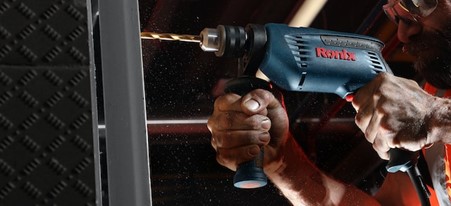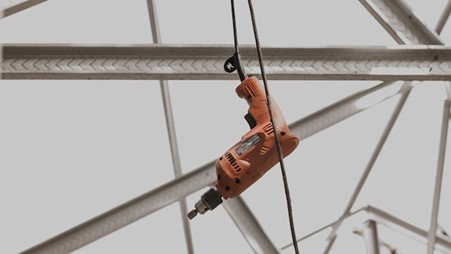Beaver Industrial Supply is an in-store and online retailer of power tools for home and industrial use. In the following article, Beaver Industrial Supply reviews how, in an era of rapid technological advancement, the enduring presence of corded tools in industrial settings speaks volumes to their versatility. These stalwart machines, powered by a direct connection to a reliable energy source, have been holding their ground against the surge of cordless alternatives, and remain the backbone of industrial operations.
The power tools industry has changed considerably in the last few years, with consumers demanding the convenience of online sales, sustainable brands, and cordless products. However, there’s a reason why industrial giants are sticking to the unbridled power and precision of corded tools.
Whether it’s the endless runtimes, relentless power, or exceptionally high capacity, industrial facilities can’t seem to stay away from corded power tools. Even though the average DIYer loves the restraint-free nature of cordless options, the demanding nature of industrial applications requires unfailing reliability — something that can be gleaned only from cords.
Despite those who would argue that cordless models provide the same power output as their corded cousins, this simply isn’t the case when it comes to large-scale establishments that necessitate the highest levels of power from their tools. Batteries simply don’t cut it, regardless of the press coverage that cordless varieties receive these days.
Beaver Industrial Supply Reviews Power Output Needed to Keep Up in Industrial Applications
Battery-powered tools, such as mixers, can be exceptionally useful in some applications, but more demanding scenarios that call for more torque demand corded products. The heavy load requirements of mixers, diamond core drills, and concrete grinders are not suitable for cordless items.
Beaver Industrial Supply reviews that, though suitable for the DIY lover, industrial moguls would truly be lost without traditional corded tools. The power output needed to produce their desired results is incredible, far surpassing home-based antics. Not only are batteries too weak to support such usage, but it’s unlikely that they would be able to run at full power for longer than a few minutes, ultimately rendering them unsuitable for the task.
Unwavering Power All Day (and Night) Long
It isn’t just about the amount of power, though. Professionals can attest to the long hours they work to ensure that jobs are finished as outlined. However, these lengthy days simply wouldn’t be possible without the corded tools that allow 24/7 high-performing functioning.
DeWalt‘s group product manager, Mike McDowell, echoes these statements, highlighting the fact that many professionals consider corded tools to be superior due to the exceptional levels of performance, reliability, and durability they supply.
Beaver Industrial Supply reviews how, during an interview with ContractorSupply, Mike went on to say that DeWalt continues to invest in the corded market and design products with high-performance motors containing roughly 40% more copper to afford boosted speed and power.
Lightweight for Easy Handling Over Long Periods
Beaver Industrial Supply reviews that while some DIYers do toil for hours each day, the time spent on their projects is considerably less than those in the industrial space. Additionally, having to work with the added weight of a battery can be rather taxing.
Corded tools are generally lighter than their cordless counterparts, thanks to their lack of batteries, making it easier for contractors to work through full days.
The Cost Comes Into Play
The director of sales in North America for RIDGID, Cliff Wells, stands by the “cost versus value” point when discussing the reasons behind industry giants’ plans to stay with corded tools.
While Wells agrees that advances in reliability, volumes of work per charge, and battery charging times have been made, the existing reasons simply aren’t enough to give up tradition and go cordless. From a business perspective, it only makes sense — corded tools remain functionally optimal, so why switch?
 They Aren’t Without Their Faults
They Aren’t Without Their Faults
Despite the obvious benefits, corded tools do have their limitations, even in the eyes of industrial moguls. After all, battery-powered options do offer unrivaled flexibility in comparison to their plugged-in cousins.
Not to mention the obvious hazard of trailing cables. Workers could potentially trip and fall, harming not only themselves, but the person using the corded tool and any objects around them. Alternatively, the cables may not stretch far enough, necessitating constant unplugging and replugging — an act that comes with an inherent risk of tangling.
Moreover, Beaver Industrial Supply reviews that the requirements surrounding PAT testing for corded tools aren’t to be dismissed either. While understandable, they can be quite time-consuming for contractors to fulfill.
Industry Giants Keep to Tradition — Faults and All
Beaver Industrial Supply reviews that the disadvantages of using corded tools may exist, but they certainly don’t outweigh the positives. Industrial applications demand exceptional amounts of power for long hours every day, and only corded varieties are capable of taking on this mammoth challenge. Only time will tell whether cordless options will ever catch up.



 They Aren’t Without Their Faults
They Aren’t Without Their Faults


